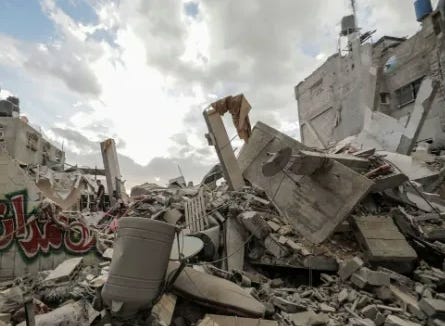(Dobbs) Until And Unless It Happens, No One Knows
Some Israelis will ask, How much damage can we endure, is this all worth it?
Is there a point at which Israel’s military forces can be stretched too thin?
Analysts call the Israel Defense Forces the most powerful military in the Middle East. But even the most powerful army can, if up against a strong, well-funded, and strategically coordinated attack from all sides, reach a breaking point. Arms are not infinite, manpower is not infinite, allied support (depending on the course of a war) is not necessarily infinite. Even resolve is not always infinite.
If anyone is in a position to explain that to Israel, it is the United States. In three major wars— looking back to Afghanistan, Iraq, and in a different era, Vietnam— we were up against an enemy we assumed was inferior. Along with our allies we outmanned them, we outgunned them, and from our point of view, we were the ones with noble goals. But they were fighting on their own turf. We were not. They were willing to go the distance. We were not. They went to war in self-defense. We went to war with hubris.
They won. We lost.
So with its military already deployed and inevitably somewhat exhausted in Gaza, how well can Israel simultaneously wage war against Hezbollah in Lebanon?
Even the Lebanese group’s leader Hassan Nasrallah acknowledged last week, after thousands of pagers and radios blew up in the faces of his members, that Israel has “technological superiority,” but he coupled that with a promise to keep showering Israel with missiles and drones.
Hezbollah has been doing that— “in solidarity with Hamas”— since the war started in Gaza, which has forced more than 60,000 Israelis to evacuate their towns and villages in the north of the country. When Israel’s prime minister Benjamin Netanyahu vowed last Wednesday, "We will return the residents of the north securely to their homes,” Nasrallah responded, “Do whatever you like. You are incapable of achieving it. Military escalation, killing, assassinations, and total war, none of them will bring those residents back to the border.”
He might be wrong. Israel might achieve its goal, but it raises three questions: Can it do that and truly ensure the safety of its citizens with an embittered Lebanese population still not far from the border? And, can it do that without bearing an unendurable cost? And, can it do that without obliterating southern Lebanon the way it has obliterated so much of Gaza? Until and unless it happens, no one knows.
If we’re keeping score, Israel has history on its side. It has bested its enemies in virtually every conflict it ever fought, including three major wars against organized Arab armies: what Israelis call the War of Independence in 1948, the Six Day War in 1967, and the Yom Kippur War in 1973. Israel hasn’t always gone about its conflicts to the world’s satisfaction, and it hasn’t always overpowered its enemies without suffering great harm itself, culminating with the invasion by Hamas on October 7th last year.
But it has shown that it fights smart. Last week’s pager attacks in Lebanon, the assassination of Hezbollah commanders in Beirut, and of course the killing at the end of July of Hamas leader Ismail Haniyeh in Tehran, the capital of Iran, all prove the point. Israel has demonstrated that it has intelligence about its enemies’ whereabouts and plans, and that it has the “technological superiority” that the Hezbollah leader invoked. In short, it has demonstrated that it can strike deep.
However, history also shows that its enemies can be implacable. After the rigged devices blew up in Beirut and killed dozens of people, Hezbollah’s Nasrallah was angry, embarrassed, and exposed, and promised, “They will face a severe reckoning.” Some will call that an empty promise because he has threatened retribution against Israel many times before without exacting a crippling toll. But at what point might that change? Yesterday’s missile attacks from Hezbollah launchers hit close to Haifa which is, after Tel Aviv and Jerusalem, Israel’s third largest city. A little closer with their precision-guided missiles and Israelis will ask, How much damage can we endure? If northern Israel remains unsafe, and Israelis still can’t safely reside in the south of the country near Gaza, some will ask, Is this all worth it? There’s also the question, were the missiles that struck near Haifa the retribution that Nasrallah threatened, or for Israel is the worst yet to come? His deputy yesterday called this “a war without limits.”
If it is, then a bigger question becomes, can Israel fight two wars at once? Its defense minister Yoav Gallant said on Wednesday, “The center of gravity is moving north. We are diverting forces, resources, and energy toward the north.” That seems like a tacit admission that if they are to put more effort into the war with Hezbollah, they must put less into the war with Hamas.
But the biggest question might be this one: could Israel’s wars with both Hamas and Hezbollah grow into a full-scale regional war? We’ve already seen the Houthis step in from Yemen, and the brutal and battle-tested Syrians, who have long been the power behind the throne in neighboring Lebanon, might enter the war on the side of Lebanon and Hezbollah. On top of that, while Iran has said it doesn’t want a regional war, could it be drawn into one anyway?
How well will Israel do if all of them coordinate against it? Especially since it won’t be walking away from Gaza?
Much has been written about what a wider war would mean to Lebanon, which has been in crisis since I intermittently covered the country back in the 1970s and ‘80s. But also, what would it mean to Israel?
Short term victories won’t guarantee long term peace. To the contrary, they will give rise to even more militancy across every Israeli border.
The Egyptians, who have been peace partners with Israel for almost 50 years now, are afraid of where all this is going, and are laying the blame on the Jewish state. Standing alongside U.S. Secretary of State Antony Blinken last week in Cairo, Egypt’s foreign minister said of the Beirut attacks, “This act of grave escalation will lead the region to what we have been warning against, which is an all-out war which will turn the region into scorched earth.”
If Israel does overextend itself— if its military does get stretched too thin to fight its wars and protect its citizens— that will mean scorched earth on all sides of the conflict. Only Israel can figure that out. And it might get it wrong.
Over more than five decades Greg Dobbs has been a correspondent for two television networks including ABC News, a political columnist for The Denver Post and syndicated columnist for Scripps newspapers, a moderator on Rocky Mountain PBS, and author of two books, including one about the life of a foreign correspondent called “Life in the Wrong Lane.” He also co-authored a book about the seminal year for baby boomers, called “1969: Are You Still Listening?” He has covered presidencies, politics, and the U.S. space program at home, and wars, natural disasters, and other crises around the globe, from Afghanistan to South Africa, from Iran to Egypt, from the Soviet Union to Saudi Arabia, from Nicaragua to Namibia, from Vietnam to Venezuela, from Libya to Liberia, from Panama to Poland. Dobbs has won three Emmys, the Distinguished Service Award from the Society of Professional Journalists, and as a 38-year resident of Colorado, a place in the Denver Press Club Hall of Fame.
You can learn more at GregDobbs.net







Frighteningly True. Thanks Greg
Very correct Greg. I started out in the north of L’Indochine and after Dien Bien Phu, the south.
There was never any question as to the resolve of the Viet Minh, who originally held the US in high esteem after we unilaterally gave the Philippines their independence in ‘46. They were thinking very long term, maybe 50 years. This at a time when McNamara came over in ‘63 and said “Boys, the war will be over in 3 months”!???